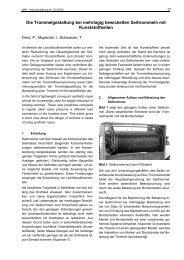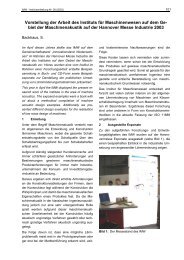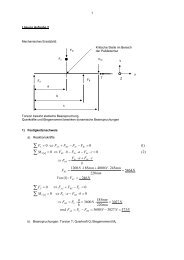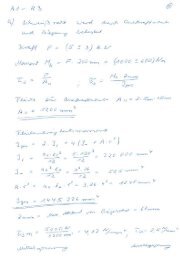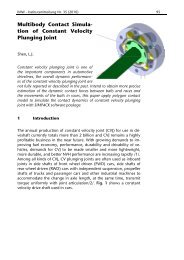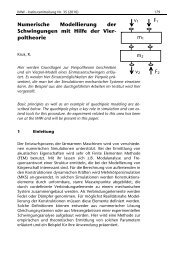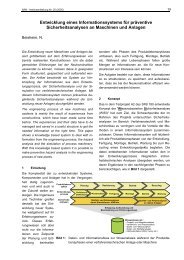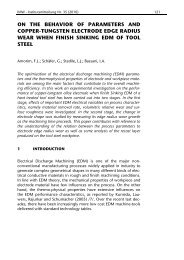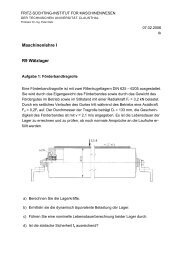I*PROMS: Innovative Production Machines and Systems - Institut für ...
I*PROMS: Innovative Production Machines and Systems - Institut für ...
I*PROMS: Innovative Production Machines and Systems - Institut für ...
Create successful ePaper yourself
Turn your PDF publications into a flip-book with our unique Google optimized e-Paper software.
IMW - <strong>Institut</strong>smitteilung Nr. 30 (2005) 43<br />
<strong>I*PROMS</strong>: <strong>Innovative</strong> <strong>Production</strong> <strong>Machines</strong> <strong>and</strong> <strong>Systems</strong><br />
Rolshofen, W.; Soroka, A.; Eldukhri, E.; Müller, D.<br />
Das <strong>Institut</strong> für Maschinenwesen (IMW) ist stellvertretend<br />
für die Technische Universität Clausthal<br />
(TUC) Mitglied im Europäischen Exzellenznetzwerk<br />
<strong>Innovative</strong> Produktionsmaschinen und Systeme<br />
(<strong>I*PROMS</strong>). Dort arbeiten 30 Partner aus 14 Ländern<br />
an Forschungsaufgaben der Fertigung und<br />
Produktion. Die Vision einer wissensbasierten Fabrik<br />
der Zukunft wird in vier unterschiedlichen Teilgruppen<br />
(Cluster) untersucht. Außerdem wird die<br />
Möglichkeit der Teilnahme an den Forschungsaktivitäten<br />
vorgestellt.<br />
Manufacturing is important to the European Union.<br />
Solving problems of fragmentation <strong>and</strong> lack of coordination<br />
of research concerning manufacturing<br />
within the EU, the Commission of the European<br />
Community has adopted Networks of Excellence<br />
(NoEs) as an instrument for promoting integration in<br />
its Sixth Framework Programme. One of this NoEs<br />
is called <strong>I*PROMS</strong>-<strong>Innovative</strong> <strong>Production</strong> <strong>Machines</strong><br />
<strong>and</strong> <strong>Systems</strong>. It aims to address many of the challenges<br />
facing the manufacturing sector in the 21st<br />
century. The paper discusses the strategy this NoE<br />
is pursuing to achieve.<br />
1 Introduction<br />
Manufacturing in the EU is increasingly being challenged<br />
by global competition /1/. Experts acknowledge<br />
that, for the EU to attain <strong>and</strong> sustain a leading<br />
role in the global market, radical measures are<br />
necessary to stimulate restructuring of the European<br />
Research Area <strong>and</strong> closer collaboration in<br />
manufacturing research. The newly enlarged EU<br />
comprises over 25 million enterprises employing<br />
more than 120 million people. The number of<br />
manufacturing businesses is calculated as being<br />
about 10% of this total, i.e. some 2.5 million /1/.<br />
European manufacturing activity today represents<br />
approximately 22 % of the EU GDP <strong>and</strong> 18-20% of<br />
the workforce.<br />
An interesting characteristic of European enterprises<br />
is that the majority of them are SMEs, with<br />
93% being micro-enterprises employing fewer than<br />
20 people. Such a characteristic can be positive in<br />
relation to opportunities, as SMEs tend to be more<br />
flexible in operation <strong>and</strong> innovative in nature, but<br />
can also be a weakness. For instance, micro enterprises<br />
have smaller export impacts: SMEs export<br />
only 13% of turnover, whereas large enterprises<br />
gain 21% of their total turnover from abroad. Furthermore,<br />
SMEs are more concerned with shortterm<br />
‘fire-fighting’ rather than longer-term RTD<br />
commitments /1/. However, as SMEs are at the<br />
very heart of manufacturing within the European<br />
Union, it is essential that they participate in research<br />
or at least that the results of RTD activities<br />
are passed onto them so the full benefit to the EU<br />
economy can be derived.<br />
In most sectors, global comparisons show that<br />
European manufacturing industry continues to be<br />
successful in maintaining its leadership. However,<br />
this position is challenged on two fronts. On the one<br />
h<strong>and</strong>, EU industry faces continuing competition<br />
from other developed economies, particularly in the<br />
high-technology sector. On the other h<strong>and</strong>, lowwage<br />
economies are increasingly threatening the<br />
more traditional manufacturing sectors /1/.<br />
The European manufacturing sector has strengths<br />
that it needs to build upon. In many respects, industry<br />
throughout Europe is modern <strong>and</strong> competitive<br />
<strong>and</strong> most sectors have made significant efforts to<br />
upgrade their production infrastructures <strong>and</strong> integrate<br />
new forms of organisation /1/. However,<br />
European industry cannot afford to be complacent<br />
<strong>and</strong> needs to adapt its production systems <strong>and</strong><br />
methodologies to meet the challenges of the 21st<br />
century.<br />
Europe has embraced the sustainable development<br />
dimension with significant investments in environmental<br />
protection, clean technologies <strong>and</strong> environmentally<br />
friendly production processes having led to<br />
new manufacturing <strong>and</strong> consumption paradigms.<br />
This could give a strong impetus to EU industries,<br />
offering the potential to exp<strong>and</strong> <strong>and</strong>/or create new<br />
markets /1/.<br />
Advanced manufacturing research holds the key to<br />
the future competitiveness of Europe. European industry<br />
needs to concentrate on innovation, high<br />
technology, high-value adding processes <strong>and</strong> high<br />
knowledge-content products to maximise its future<br />
potential.
44 IMW - <strong>Institut</strong>smitteilung Nr. 30 (2005)<br />
However, research investment in the EU is considered<br />
to be too low. These raises many potential<br />
problems linked to the sustainable competitiveness<br />
of the European manufacturing sector in a complex<br />
<strong>and</strong> globalise environment /1/. Significant investment<br />
in relevant research would help to sustain not<br />
only competitiveness but also employment. Evidence<br />
of this comes from the Netherl<strong>and</strong>s where,<br />
between 1994 <strong>and</strong> 1998, 8% of fast-exp<strong>and</strong>ing<br />
firms created 60% of employment growth /2/.<br />
Research within the EU also has a tendency to be<br />
highly fragmented with research being conducted<br />
by thous<strong>and</strong>s of organisations with little coordination<br />
<strong>and</strong> with duplication of resources <strong>and</strong> efforts.<br />
This is compounded by duplication of funding<br />
for research at regional, national <strong>and</strong> EU levels.<br />
2 Networks of Excellence (NoE)<br />
Networks of Excellence (NoEs) are a new ‘instrument’<br />
introduced to FP6 by the European Commission.<br />
NoEs are aimed primarily at overcoming<br />
fragmentation of European research. The main deliverable<br />
of a NoE is durable structuring <strong>and</strong> shaping<br />
of the way that research in Europe is carried out<br />
on particular topic /3/.<br />
NoEs are designed to strengthen scientific <strong>and</strong><br />
technological research excellence in particular subjects<br />
in a cost-effective way. Through integration,<br />
NoEs can eliminate duplication of efforts <strong>and</strong><br />
maximise resource utilisation. This is to be<br />
achieved by assembling at the European level the<br />
critical mass of human <strong>and</strong> material capital needed<br />
to provide European leadership in the chosen<br />
spheres of activity. Central to a NoE is a joint work<br />
programme aimed principally at creating progressive<br />
<strong>and</strong> long-term integration of the research capacities<br />
of the network members. At the same time,<br />
the programme also includes joint research activities<br />
to advance the state-of-the-art in the particular<br />
field.<br />
The sizes of NoEs can vary. However, they are all<br />
characterised by being virtual centres of excellence<br />
with strong governance. Their common driving factor<br />
is to pursue ambitious research objectives <strong>and</strong><br />
mobilise the resources needed to achieve their targets<br />
<strong>and</strong> to meet the primary goal of integrating research<br />
within the European Union. In addition, part<br />
of their mission is also to spread excellence well<br />
beyond their own boundaries.<br />
This paper outlines a Network as example of FP6<br />
NoEs designed to help integrate research in advanced<br />
manufacturing in the EU. The <strong>Innovative</strong><br />
<strong>Production</strong> <strong>Machines</strong> <strong>and</strong> <strong>Systems</strong> (<strong>I*PROMS</strong>) NoE<br />
is an umbrella network covering the whole area of<br />
knowledge-based production technology <strong>and</strong> organisation,<br />
an area critical to manufacturing competitiveness.<br />
Fig. 1: <strong>I*PROMS</strong> <strong>and</strong> the Six Manufacturing Challenges /6/.
IMW - <strong>Institut</strong>smitteilung Nr. 30 (2005) 45<br />
3 <strong>Innovative</strong> <strong>Production</strong> <strong>Machines</strong> <strong>and</strong> <strong>Systems</strong><br />
(<strong>I*PROMS</strong>)<br />
<strong>I*PROMS</strong> NoE integrates the activities of 30 likeminded<br />
research institutions <strong>and</strong> companies in the<br />
field of production research from 14 European<br />
countries. It seeks to achieve the goal of strengthening<br />
the European research base in the umbrella<br />
area of <strong>Innovative</strong> <strong>Production</strong> <strong>Machines</strong> <strong>and</strong> <strong>Systems</strong>.<br />
Like other FP6 NoEs, <strong>I*PROMS</strong> focuses on<br />
integration but also includes joint research <strong>and</strong> dissemination<br />
activities to advance the re-search frontier<br />
in the area <strong>and</strong> spread excellence widely.<br />
3.1 Research Challenges<br />
Addressing the NMP (Nanotechnologies <strong>and</strong> Nanosciences,<br />
Knowledge-based Multifunctional Materials<br />
<strong>and</strong> New <strong>Production</strong> Processes <strong>and</strong> Devices)<br />
thematic area /4/, <strong>I*PROMS</strong> aims to facilitate the<br />
development of common concepts, tools <strong>and</strong> techniques<br />
enabling the creation <strong>and</strong> operation of flexible,<br />
re-configurable, fault-tolerant <strong>and</strong> eco- <strong>and</strong><br />
user-friendly production systems that can react to<br />
changing customer needs, environmental requirements,<br />
design inputs <strong>and</strong> material, process <strong>and</strong> labour<br />
availability to manufacture high quality, costeffective<br />
products.<br />
<strong>I*PROMS</strong> will address the six ‘Visionary Manufacturing<br />
Challenges for 2020’ published by the National<br />
Academy of Sciences /5, 6, 7/, namely,<br />
- Concurrent Manufacturing,<br />
- Integration of Human <strong>and</strong> Technical Resources,<br />
- Conversion of Information to Knowledge,<br />
- Environmental Compatibility,<br />
- Re-configurable Enterprises,<br />
- <strong>Innovative</strong> Manufacturing Processes <strong>and</strong> Products.<br />
Research on the above challenges will be pursued<br />
by four interconnected research clusters (s. Fig. 1):<br />
Advanced <strong>Production</strong> <strong>Machines</strong> (APM), <strong>Production</strong><br />
Automation <strong>and</strong> Control (PAC), <strong>Innovative</strong> Design<br />
Technology (IDT) <strong>and</strong> <strong>Production</strong> Organisation <strong>and</strong><br />
Management (POM).<br />
The APM cluster is concerned with machines for<br />
processing new/nano/smart/high-performance materials,<br />
micro-manufacture machines, rapid manufacturing<br />
machines, <strong>and</strong> manufacturing robots. The<br />
PAC cluster includes self-adaptive control, flexible/re-configurable<br />
manufacturing, adaptive quality<br />
systems, agent-based distributed architectures,<br />
(machine) knowledge management, <strong>and</strong> humanmachine<br />
interaction. IDT relates to the designers of<br />
the factory <strong>and</strong> products of the future, designing the<br />
innovative, customisable, value-added products of<br />
the future, <strong>and</strong> the factory machines <strong>and</strong> systems<br />
required to produce them. POM represents the<br />
management of the factory of the future. It includes<br />
advanced process control, enterprise <strong>and</strong> manufacturing<br />
simulation, (human) knowledge management<br />
Fig. 2: Core team from different expertise inside Europe.
46 IMW - <strong>Institut</strong>smitteilung Nr. 30 (2005)<br />
<strong>and</strong> human-computer interaction at the organisational,<br />
enterprise level.<br />
3.2 Activities<br />
Under <strong>I*PROMS</strong> umbrella the four research clusters<br />
will undertake the following activities:<br />
- Integration, <strong>I*PROMS</strong> aims to integrate its operations<br />
within 5 years to become a globally<br />
recognised <strong>and</strong> industrially effective Virtual<br />
Centre of Excellence, with its own management<br />
structure <strong>and</strong> vision for delivering increased<br />
competitiveness <strong>and</strong> value for manufacturing.<br />
- Joint Research Activities, <strong>I*PROMS</strong>’s jointly<br />
executed research will address the six Manufacturing<br />
Challenges for 2020 /8/ through the<br />
above mentioned <strong>I*PROMS</strong> clusters - achieved<br />
through collaborative research.<br />
- Spreading of Excellence, <strong>I*PROMS</strong> will exploit<br />
results produced through its activities, disseminating<br />
knowledge, both to those outside <strong>and</strong> inside<br />
the net-work.<br />
- First Virtual International Conference /9/ on Intelligent<br />
<strong>Production</strong> <strong>Machines</strong> <strong>and</strong> <strong>Systems</strong><br />
was held in July 2005. This activity was organised<br />
in a way that participants can meet <strong>and</strong><br />
discuss themes of common interest through the<br />
use of communication tools at a central location<br />
on the Internet.<br />
4 Possible Opportunities<br />
With this NoE, enterprises interested in the field of<br />
innovative production machines <strong>and</strong> systems (as<br />
well as universities) can be connected through associate<br />
membership of the NoE. This allows cooperation<br />
<strong>and</strong> new research assignments with<br />
some of the thirty core partners (s. Fig. 2) supported<br />
by the European Commission. Moreover,<br />
through this partnership every activity in <strong>I*PROMS</strong><br />
NoE can be benefited from, first access to published<br />
documents about results is available <strong>and</strong> international<br />
scientific relations with experts can be<br />
established. Therefore, <strong>I*PROMS</strong> can be considered<br />
a platform for everybody who attaches importance<br />
to future tasks in European manufacturing<br />
/10, 11/.<br />
5 Acknowledgement<br />
The <strong>Innovative</strong> <strong>Production</strong> <strong>Machines</strong> <strong>and</strong> <strong>Systems</strong><br />
(<strong>I*PROMS</strong>) Network of Excellence FP6-500273-2 is<br />
funded by the European Commission under the<br />
Sixth Framework Programme. The authors would<br />
like to thank the Commission <strong>and</strong> the partners of<br />
<strong>I*PROMS</strong> Network of Excellence for their contributions<br />
<strong>and</strong> support.<br />
6 References<br />
/1/ European Manufacturing of the Future, Role of<br />
research <strong>and</strong> education for European leadership,<br />
Manufacture 2003 conference, Milan, Italy<br />
1-2 December 2003<br />
/2/ Entrepreneurship in the Netherl<strong>and</strong>s, <strong>Innovative</strong><br />
entrepreneurship, New policy challenge,<br />
Ministry of Economic Affairs <strong>and</strong> EIM, February<br />
2002<br />
/3/ Provisions for implementing networks of excellence:<br />
Background document, European Commission,<br />
12 May 2003<br />
/4/ Integrating <strong>and</strong> strengthening the European<br />
Research Area, Thematic Area 3 Nanotechnology<br />
<strong>and</strong> nanosciences, knowledge-based multifunctional<br />
materials, new production processes<br />
<strong>and</strong> devices Work Programme, European<br />
Commission, December 2003<br />
/5/ Visionary Research Challenges for 2020,<br />
Committee on Visionary Manufacturing Challenges,<br />
Board on Manufacturing <strong>and</strong> Engineering<br />
Design, Commission on Engineering <strong>and</strong><br />
Technical <strong>Systems</strong>, National Research Council,<br />
National Academy of Sciences, 1998<br />
/6/ Pham, D. T., Eldukhri, E. E., Setchi, R., Soroka,<br />
A., Packianather, M. S., Thomas, A., Dadam,<br />
Y. <strong>and</strong> S. Dimov: Integrating European advanced<br />
manufacturing research: The FP6<br />
<strong>I*PROMS</strong> Network of Excellence, Intelligent<br />
Computation in Manufacturing Engineering.<br />
INDIN 2005, Berlin, pp 543-548.<br />
/7/ Pham D.T., Eldukhri E.E., Setchi R., Soroka<br />
A.J., Packianather M.S., Thomas A., Dadam Y.,<br />
Dimov S. Integrating European Advanced<br />
Manufacturing Research: The FP6 <strong>I*PROMS</strong><br />
Network of Excellence. Intelligent Computation<br />
in Manufacturing Engineering 4, 2004<br />
/8/ www.iproms.org<br />
/9/ http://conference.iproms.org<br />
/10/ Düsing, C., Grünendick, T., Müller, D., Rolshofen,<br />
W.: <strong>Institut</strong>smitteilung Nr. 29, IMW Clausthal<br />
2004<br />
/11/ Grünendick, T., Müller, D. <strong>and</strong> W. Rolshofen:<br />
Die Fabrik der Zukunft- ein europäisches Netzwerk,<br />
TU Contact, 16, May 2005



